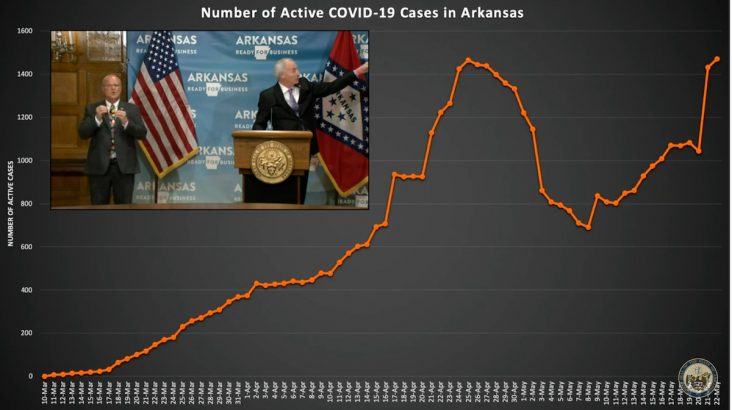Known COVID-19 cases up 154 on Thursday; ‘clusters’ not seen in newly opened sectors
by May 22, 2020 3:21 pm 1,062 views

In the 72 days since COVID-19 reared its fatal and economically disruptive head in Arkansas, almost 11% of the known new cases – 609 – have been reported in the previous two days. Of the total since March, 13.5% are in Pulaski County, the state’s most populous.
The number of known cases on Thursday spiked at 455, and another 154 were reported Friday (May 22) during Gov. Asa Hutchinson’s daily COVID-19 briefing. The two days account for 10.85% of the total cases reported since March 11.
Known COVID-19 cases in Arkansas totaled 5,612 on Friday, up from 5,458 on Thursday. Of the 154 new cases, 19 were from correctional facilities. The number of deaths rose from 110 to 113. Of the total cases, 1,470 are active cases, 510 are in correctional facilities and 86 in nursing homes. The number of COVID patients hospitalized in Arkansas was 81 on Friday, down from 86 on Thursday. There are 14 patients on ventilators, unchanged from Thursday. There are 4,029 Arkansans who have recovered.
As of Friday at 1 p.m., there were 1,588,322 U.S. cases and 95,276 deaths. Globally, there were 5,159,674 cases and 335,418 deaths.
Of the 135 new community cases reported Friday, 40% were in Washington County (32) and Benton County (22). Arkansas Secretary of Health Dr. Nate Smith said more than half of the Washington County cases were traced to three households.
And of the 224 new community cases reported Thursday, Smith said 137 were as of noon Friday “successfully contacted” through the state’s growing contact tracing program. Of the 137, 24% had contact with a previous case and 37 are connected with clusters at sites of employment. The sites of employment and number of cases reported by Smith are: Nebo Poultry in Dardanelle (21), Ozark Poultry in Rogers (7), St. Bernards Medical Center in Jonesboro (5), and Cargill in Springdale (4).
Smith said only two cases reported being at a restaurant and only two reported being at a gym.
“So far we’re not seeing any clusters related to these activities that we’ve newly opened up,” Smith said Friday.
Gov. Hutchinson was asked his assessment of moving to phase two or reopening the economy considering the recent rise in cases. The governor had initially set May 18 as a possible move into phase two, but delayed the move after cases began to rise.
“Obviously with the uptick we’ve seen, yesterday particularly, we’re not thinking about phase two right now in the very short term. But we are always looking at it in that 14-day period, because that’s sort of the window that you want to see the right trend in either cases or the positivity rate,” Gov. Hutchinson said.
The governor was also asked his view on expanding – or not – mail-in voting for the November general election. A growing number of states are considering the option, and a recent report by the New York Times indicated that 11 of 16 states with limits on who can vote absentee by mail have are making it easier to do so. According to the National Conference of State Legislatures, only five states – Colorado, Hawaii, Oregon, Washington and Utah – conduct all elections entirely by mail.
Gov. Hutchinson said the issue is not on his “front burner.”
“We just haven’t had the necessity of articulating what we need to do in November and we’ll evaluate that,” he said.
Gov. Hutchinson also said Friday the state’s troubled Pandemic Unemployment Assistance (PUA) website is now secure and working with 7,105 claims processed as of noon Friday. He said another 3,000 more will have funds sent to them by the end of day on Friday, and between 60-70 people will work through the weekend to handle calls and process claims.
It was learned May 15 the state’s website managing PUA benefits had been breached. The flaw allowed the person to see the Social Security number, bank account info and other details of a person’s application. It is estimated the breach impacted around 30,000 applications.
Also on Friday, the U.S. Department of Health and Human Services (HHS) announced the awarding of $72.41 million in additional relief funds to Arkansas skilled nursing facilities (SNFs) to help them combat the effects of COVID-19. It is part of the nearly $4.9 billion allocated by HHS to SNFs and may be used to address critical needs such as labor, testing capacity, personal protective equipment and a range of other expenses directly linked to COVID-19. Distribution of the funds will be based on both a fixed basis and variable basis. Each SNF will receive a fixed distribution of $50,000, plus a distribution of $2,500 per bed. All certified SNFs with six or more certified beds are eligible for this targeted distribution.
